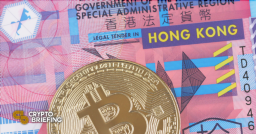Hong Kong Proposal to Ban Retail Crypto Traders Sees Backlash

Key Takeaways
- Global Digital Finance has expressed concern over proposal that cryptocurrency trading in Hong Kong should be limited to professionals.
- In Nov 2020, Hong Kong’s Financial Services and the Treasury Bureau (FSTB) proposed its new rules that govern how crypto exchanges operate.
- According to GDF, limiting trading services to professional investors would create furthers issues in compliance.
Crypto industry body Global Digital Finance (GDF) has cautioned against the proposed regulations in Hong Kong that would allow cryptocurrency trading for professional investors only.
Hong Kong Regulations Could Put Investors at Risk
In Nov 2020, Hong Kong’s Financial Services and the Treasury Bureau (FSTB) issued its Legislative Proposals to bring AML regulations for crypto exchanges as per the recommendations from Financial Action Task Force (FATF).
One specific proposal says that crypto exchanges should offer trading services to professional investors only. Recently, leading crypto industry body Global Digital Finance (GDF) said this proposal was a major concern.
GDF boasts members such as Bitfinex, Coinbase, Huobi as members. The group stated that limiting trading services to professional investors would create furthers issues in compliance.
Driving retail investors to use unregulated trading services would be counterproductive for regulators, said the organization.
GDF added if the proposal is enforced, it “may see non-professional investors move towards unregulated platforms that may create new areas of financial crime risk.”
“Some of the proposals, particularly limiting to professional investors, go beyond the FATF Recommendations,” wrote GDF in a recent consultation document.
The organization reasoned that other FATF member countries such as Singapore, the UK, and the US have allowed retail investors to trade cryptocurrencies.
Millionaire Traders Only
As per Hong Kong law, to qualify as a professional investor, one must own an investment portfolio of at least HK$8 million (~US$1 million).
According to a survey, only 504,000 people (or 7%) of the city’s population owned more than US$1 million, and therefore, qualified to be professional investors in mid-2020.
This means that if the new crypto law is passed, it will deprive more than 90% of the population of investing in cryptocurrencies. The draft proposals were under public consultation till 31 Jan 2021 and may soon be passed into law.
Hong Kong has been considered one of the most active regions for crypto investors, partly due to its friendly regulations.
If enforced, the new proposal would negatively impact the city’s leadership position in the industry.
Disclosure: The author did not hold crypto mentioned in this article at the time of press.
The information on or accessed through this website is obtained from independent sources we believe to be accurate and reliable, but Decentral Media, Inc. makes no representation or warranty as to the timeliness, completeness, or accuracy of any information on or accessed through this website. Decentral Media, Inc. is not an investment advisor. We do not give personalized investment advice or other financial advice. The information on this website is subject to change without notice. Some or all of the information on this website may become outdated, or it may be or become incomplete or inaccurate. We may, but are not obligated to, update any outdated, incomplete, or inaccurate information.
You should never make an investment decision on an ICO, IEO, or other investment based on the information on this website, and you should never interpret or otherwise rely on any of the information on this website as investment advice. We strongly recommend that you consult a licensed investment advisor or other qualified financial professional if you are seeking investment advice on an ICO, IEO, or other investment. We do not accept compensation in any form for analyzing or reporting on any ICO, IEO, cryptocurrency, currency, tokenized sales, securities, or commodities.
See full terms and conditions.
Source: Read Full Article

























